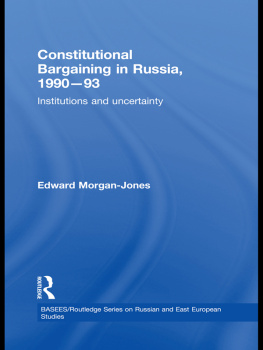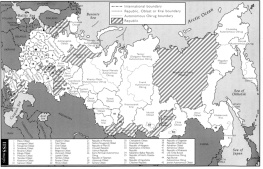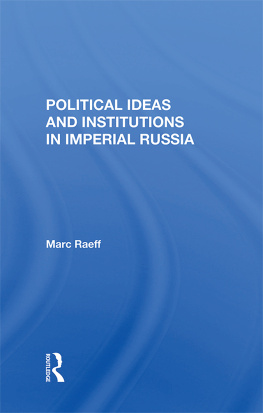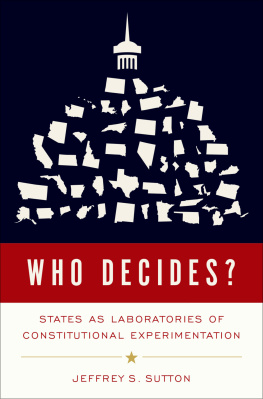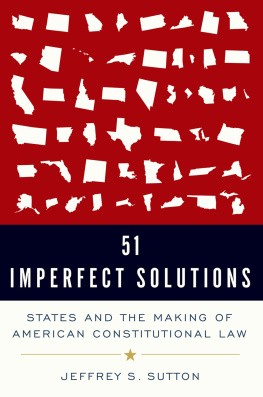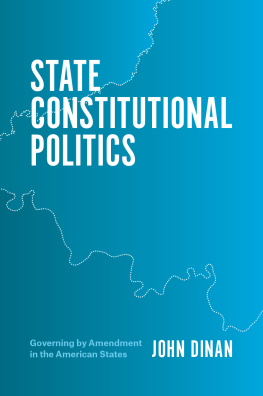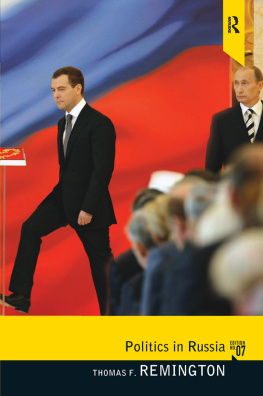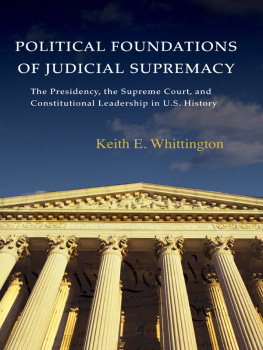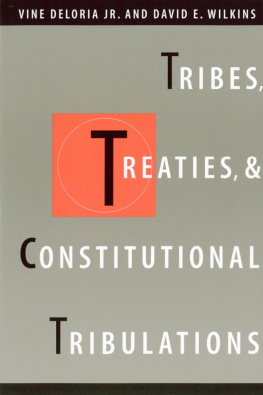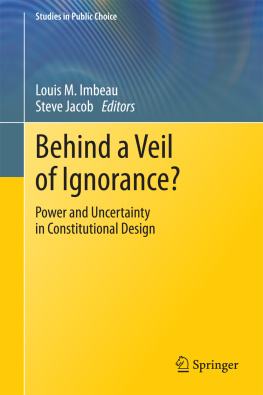Constitutional Bargaining in Russia, 199093
The years 199093 were a critical moment in Russias political development. This book provides a systematic explanation of outcomes of constitutional bargaining processes in Russia, which radically reshaped the institutions of the Russian state: removing Russia from constitutional subordination to the Soviet Union in 1990; creating a presidency and a constitutional court in 1991; and restructuring the relationship between the central state and its component federal units with the passage of three Federal Treaties in 1992. The book explores the reasons for these outcomes and identifies why there were consistent delays to the passage of a new Russian constitution, as well as why negotiations eventually broke down.
The book assesses the plausibility of different theoretical approaches to constitutional choice and argues that the role of uncertainty (and politicians strategic responses to uncertainty) in shaping constitutional outcomes has been under-explored by rational choice approaches to constitutional bar gaining. Using a rich set of source materials including roll-call votes, parliamentary records, unpublished parliamentary and constitution commission documents and Russian newspapers the book provides a detailed study of Russian politicians decision-making about constitutional choices. It is a valuable resource to those interested in Russia and post-communist politics, the origins of political institutions, comparative government, democratisation and development studies.
Edward Morgan-Jones is Lecturer in Comparative Politics at the University of Kent, UK.
BASEES/Routledge Series on Russian and East European Studies
Series editor: Richard Sakwa, Department of Politics and International Relations, University of Kent
Editorial Committee: Julian Cooper, Centre for Russian and East European Studies, University of Birmingham, Terry Cox,
Department of Central and East European Studies, University of Glasgow, Rosalind Marsh, Department of European Studies and Modern Languages, University of Bath, David Moon,
Department of History, University of Durham, Hilary Pilkington, Department of Sociology, University of Warwick, Stephen White, Department of Politics, University of Glasgow
Founding Editorial Committee Member: George Blazyca, Centre for Contemporary European Studies, University of Paisley
This series is published on behalf of BASEES (the British Association for Slavonic and East European Studies). The series comprises original, high-quality, research-level work by both new and established scholars on all aspects of Russian, Soviet, post-Soviet and East European Studies in humanities and social science subjects.
1. Ukraines Foreign and Security Policy, 19912000
Roman Wolczuk
2. Political Parties in the Russian Regions
Derek S. Hutcheson
3. Local Communities and Post-Communist Transformation
Edited by Simon Smith
4. Repression and Resistance in Communist Europe
J.C. Sharman
5. Political Elites and the New Russia
Anton Steen
6. Dostoevsky and the Idea of Russianness
Sarah Hudspith
7. Performing Russia Folk Revival and Russian Identity
Laura J. Olson
8. Russian Transformations
Edited by Leo McCann
9. Soviet Music and Society under Lenin and Stalin
The baton and sickle
Edited by Neil Edmunds
10. State Building in Ukraine
The Ukranian parliament, 19902003
Sarah Whitmore
11. Defending Human Rights in Russia
Sergei Kovalyov, dissident and human rights commissioner, 19692003
Emma Gilligan
12. Small-Town Russia
Post-communist livelihoods and identities: a portrait of the intelligentsia in Achit, Bednodemyanovsk and Zubtsov, 19992000
Anne White
13. Russian Society and the Orthodox Church
Religion in Russia after communism
Zoe Knox
14. Russian Literary Culture in the Camera Age
The word as image
Stephen Hutchings
15. Between Stalin and Hitler
Class war and race war on the Dvina, 194046
Geoffrey Swain
16. Literature in Post-Communist Russia and Eastern Europe
The Russian, Czech and Slovak fiction of the changes, 198898
Rajendra A. Chitnis
17. The Legacy of Soviet Dissent
Dissidents, democratisation and radical nationalism in Russia
Robert Horvath
18. Russian and Soviet Film Adaptations of Literature, 19002001
Screening the word
Edited by Stephen Hutchings and Anat Vernitski
19. Russia as a Great Power
Dimensions of security under Putin
Edited by Jakob Hedenskog, Vilhelm Konnander, Bertil Nygren, Ingmar Oldberg and Christer Pursiainen
20. Katyn and the Soviet Massacre of 1940
Truth, justice and memory
George Sanford
21. Conscience, Dissent and Reform in Soviet Russia
Philip Boobbyer
22. The Limits of Russian Democratisation
Emergency powers and states of emergency
Alexander N. Domrin
23. The Dilemmas of Destalinisation
A social and cultural history of reform in the Khrushchev era
Edited by Polly Jones
24. News Media and Power in Russia
Olessia Koltsova
25. Post-Soviet Civil Society
Democratization in Russia and the Baltic States
Anders Uhlin
26. The Collapse of Communist Power in Poland
Jacqueline Hayden
27. Television, Democracy and Elections in Russia
Sarah Oates
28. Russian Constitutionalism
Historical and contemporary development
Andrey N. Medushevsky
29. Late Stalinist Russia
Society between reconstruction and reinvention
Edited by Juliane Frst
30. The Transformation of Urban Space in Post-Soviet Russia
Konstantin Axenov, Isolde Brade and Evgenij Bondarchuk
31. Western Intellectuals and the Soviet Union, 192040
From Red Square to the Left Bank
Ludmila Stern
32. The Germans of the Soviet Union
Irina Mukhina
33. Re-constructing the Post-Soviet Industrial Region
The Donbas in transition
Edited by Adam Swain

